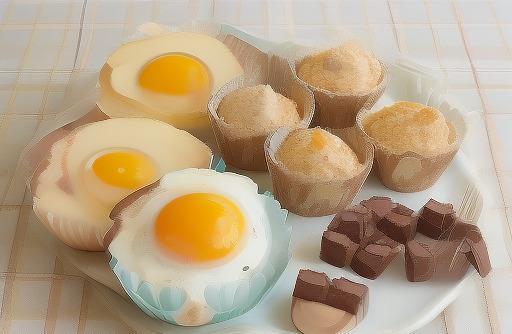- You are here:
- Home »
- Food Substitutes
- » Best Substitutes For Eggs In Cookies
Best Substitutes For Eggs In Cookies

Eggs are a common ingredient in cookie recipes, as they provide structure, moisture, and help bind the ingredients together. However, not everyone can or wants to consume eggs due to dietary restrictions, allergies, or personal preferences. Fortunately, there are several substitutes for eggs in cookies that can still result in delicious, flavorful treats.
In this article, we will explore the best substitutes for eggs in cookies, how to choose the right substitute for your needs, and provide some helpful tips and recipes to ensure your cookies turn out just as tasty without the eggs.
Key Takeaways
- Eggs play a crucial role in cookies, providing structure, moisture, and binding.
- Several substitutes can mimic the functions of eggs in cookies.
- The best substitute for eggs in cookies depends on the desired outcome, dietary restrictions, and personal preferences.
- Different substitutes may require adjustments in measurements and baking techniques.
- Experimenting with different substitutes and recipes can lead to unique and delicious cookies.
Why You Need A Substitute For Eggs In Cookies
There are several reasons why you might need a substitute for eggs in your cookie recipes:
- Allergies or dietary restrictions: Some individuals have allergies to eggs or follow a vegan or vegetarian lifestyle that excludes animal products.
- Availability: You might find yourself without eggs when you want to bake cookies, and going to the grocery store is not convenient or possible.
- Personal preference: You might simply prefer to avoid eggs in your baking for various reasons, such as reducing cholesterol intake or minimizing the risk of foodborne illnesses.
Regardless of the reason, using substitutes for eggs in cookies can ensure everyone can enjoy your delicious treats.
Types Of Substitutes For Eggs In Cookies

Before we dive into the best substitutes for eggs in cookies, it’s helpful to understand the different types of substitutes available:
-
Commercial Egg Replacers: These are products specifically designed to replace eggs in baking. They are typically made from a combination of starches, leavening agents, and binding agents. Commercial egg replacers often provide similar moisture and binding properties as eggs, making them a convenient option.
-
Plant-based Ingredients: Many plant-based ingredients can mimic the functions of eggs in baking. Common options include applesauce, mashed bananas, yogurt, silken tofu, and ground flaxseeds or chia seeds mixed with water.
-
Baking Powder and Baking Soda: These leavening agents can be used to help cookies rise and provide some of the structure typically provided by eggs.
-
Carbonated Water or Soda: The carbonation in these beverages can help create a light and airy texture in cookies, similar to what eggs would do.
-
Condensed Milk: For a rich and chewy texture, condensed milk can be used as an alternative to eggs. It adds moisture and provides a slight caramel flavor.
-
Buttermilk or Vinegar: These acidic ingredients can react with baking soda to create carbon dioxide, which helps the cookies rise and achieve a tender texture.
-
Aquafaba: This is the liquid from cooked beans or legumes, usually chickpeas. It can be whipped into a foam and used as a binder and leavening agent in cookies.
Now that we have an understanding of the different types of substitutes, let’s explore the best substitutes for eggs in cookies and how to choose the right one for your specific needs.
Best Substitutes For Eggs In Cookies
-
Applesauce: This is a popular substitute for eggs, especially in recipes that call for one or two eggs. Applesauce adds moisture to the dough and helps bind the ingredients together. It also adds a subtle sweetness to the cookies. To replace one egg, use ¼ cup of unsweetened applesauce.
-
Mashed Bananas: Mashed ripe bananas can replace eggs in recipes that call for one or two eggs. They add moisture, natural sweetness, and help bind the ingredients. The flavor of the bananas can be noticeable, so it works best in recipes where the flavor complements the other ingredients. Use ¼ cup of mashed bananas to replace one egg.
-
Yogurt: Yogurt, particularly plain or Greek yogurt, can serve as a substitute for eggs. It adds moisture, richness, and some tang to the cookies. Use ¼ cup of yogurt to replace one egg.
-
Silken Tofu: Silken tofu is a smooth and creamy form of tofu and works well as an egg substitute in cookies. It adds moisture and helps bind the ingredients together. Blend ¼ cup of silken tofu until smooth and use it to replace one egg.
-
Ground Flaxseeds or Chia Seeds: Both ground flaxseeds and chia seeds can be mixed with water to create a gel-like consistency that acts as a binder in cookies. Use 1 tablespoon of ground flaxseeds or chia seeds mixed with 3 tablespoons of water to replace one egg.
-
Carbonated Water or Soda: Carbonated water or soda can make cookies light and airy, similar to eggs. Replace each egg with ¼ cup of carbonated water or soda.
-
Condensed Milk: Condensed milk adds moisture and richness to cookies, resulting in a chewy texture. Use ¼ cup of condensed milk to replace one egg.
-
Buttermilk or Vinegar: If a recipe calls for eggs and uses baking soda as a leavening agent, you can replace each egg with 1 tablespoon of vinegar or lemon juice mixed with 1 teaspoon of baking soda. The acidic ingredient reacts with baking soda to produce carbon dioxide, helping the cookies rise.
-
Aquafaba: This unique substitute might sound unusual, but it can work wonders in cookies. Use 3 tablespoons of aquafaba to replace one egg. Whip the aquafaba until it becomes frothy before adding it to the cookie dough.
Choosing The Right Substitute For Eggs In Cookies
When choosing a substitute for eggs in cookies, consider the following factors:
-
Desired Outcome: Consider the texture and flavor you want to achieve in your cookies. Some substitutes, like applesauce and mashed bananas, add moisture and sweetness, resulting in soft and tender cookies. Other substitutes, like yogurt and silken tofu, add richness and a slightly tangy flavor. Choosing the right substitute can help you achieve the desired outcome.
-
Dietary Restrictions: If you or someone you’re baking for has a specific dietary restriction, such as being vegan or avoiding certain allergens, ensure that the substitute you choose aligns with those restrictions. Plant-based substitutes like applesauce, mashed bananas, silken tofu, and ground flaxseeds or chia seeds are excellent options for vegans.
-
Recipe Compatibility: Consider how well the substitute will complement the other ingredients and flavors in your recipe. For example, bananas work well in recipes with chocolate or nut flavors, while applesauce pairs nicely with cinnamon and spices.
-
Personal Preferences: It’s always important to consider your own taste preferences when choosing a substitute. Experimenting with different substitutes and recipes can lead to unique and delicious combinations that cater to your personal preferences.
It’s worth noting that different substitutes may result in slightly different textures and flavors. Don’t be afraid to experiment and find the substitute that works best for you.
Pro Tip: When experimenting with substitutes for eggs in cookies, start by replacing one egg first. This will allow you to gauge the effects and make adjustments as needed. Keep in mind that certain substitutes may require additional adjustments in measurements or baking techniques.
Cooking With Substitutes For Eggs In Cookies
Once you’ve chosen the right substitute for eggs in your cookies, it’s essential to know how to incorporate it into your recipe. Here are a few tips for cooking with substitutes for eggs:
-
Measurements: When measuring the substitute, use the recommended amounts listed above to replace each egg in the recipe. Make sure to measure accurately to maintain the balance of ingredients.
-
Additional Binders: Some substitutes, such as ground flaxseeds or chia seeds, may require additional liquid to compensate for their thickening properties. If your dough appears dry, add a teaspoon or two of water until the desired consistency is achieved.
-
Baking Time and Temperature: While most substitutes for eggs will not significantly affect the baking time or temperature, it’s always a good idea to keep an eye on your cookies as they bake. The visual cues, such as golden edges and a slightly set center, are reliable indicators of doneness.
-
Texture: Be aware that cookies made with substitutes may have slightly different texture compared to traditional egg-based cookies. They might be slightly denser, softer, or have a different mouthfeel. Embrace the uniqueness of your cookies and enjoy the flavors they bring.
Remember, baking is both a science and an art, so don’t be discouraged if the first attempt doesn’t turn out exactly as expected. Experimentation and practice will help you master the art of baking with substitutes for eggs in cookies.
Recipes Using Substitutes For Eggs In Cookies
Now that you have an understanding of different substitutes and tips for cooking with them, here are a few delicious recipes to get you started:
1. Chocolate Chip Cookies With Applesauce
- 1 cup all-purpose flour
- ½ teaspoon baking soda
- ¼ teaspoon salt
- ½ cup unsalted butter, softened
- ½ cup granulated sugar
- ¼ cup packed brown sugar
- ¼ cup unsweetened applesauce
- 1 teaspoon vanilla extract
- 1 cup semisweet chocolate chips
Instructions:
- Preheat the oven to 375°F (190°C). Line a baking sheet with parchment paper.
- In a medium bowl, whisk together the flour, baking soda, and salt. Set aside.
- In a large mixing bowl, cream together the softened butter, granulated sugar, and brown sugar until light and fluffy.
- Add the applesauce and vanilla extract to the butter mixture. Mix until well combined.
- Gradually add the dry ingredients to the wet ingredients, mixing until just combined. Fold in the chocolate chips.
- Drop rounded spoonfuls of dough onto the prepared baking sheet, spacing them about 2 inches apart.
- Bake for 9-11 minutes, or until the edges are golden brown.
- Allow the cookies to cool on the baking sheet for a few minutes, then transfer them to a wire rack to cool completely.
2. Oatmeal Raisin Cookies With Mashed Bananas
- 1 cup old-fashioned oats
- 1 cup all-purpose flour
- 1 teaspoon baking soda
- 1 teaspoon ground cinnamon
- ½ teaspoon salt
- ½ cup unsalted butter, softened
- ½ cup granulated sugar
- ½ cup packed brown sugar
- 1 mashed ripe banana
- 1 teaspoon vanilla extract
- 1 cup raisins
Instructions:
- Preheat the oven to 350°F (175°C). Line a baking sheet with parchment paper.
- In a medium bowl, whisk together the oats, flour, baking soda, cinnamon, and salt. Set aside.
- In a large mixing bowl, cream together the softened butter, granulated sugar, and brown sugar until light and fluffy.
- Add the mashed banana and vanilla extract to the butter mixture. Mix until well combined.
- Gradually add the dry ingredients to the wet ingredients, mixing until just combined. Fold in the raisins.
- Drop rounded spoonfuls of dough onto the prepared baking sheet, spacing them about 2 inches apart.
- Bake for 10-12 minutes, or until the edges are slightly golden.
- Allow the cookies to cool on the baking sheet for a few minutes, then transfer them to a wire rack to cool completely.
Feel free to customize these recipes by adding your favorite mix-ins, such as nuts or shredded coconut. The substitutions mentioned in the recipes will provide you with delicious cookies that are egg-free.
Storage And Shelf Life Of Substitutes
When you have leftover cookies made with substitutes for eggs, it’s essential to know how to store them properly to maintain their freshness:
-
Room Temperature: Cookies made with substitutes for eggs can be stored at room temperature in an airtight container for 3-5 days. Keep them in a cool and dry place away from direct sunlight or heat sources.
-
Refrigerator: If you prefer to extend the shelf life of your cookies, you can store them in the refrigerator for up to 1 week. Place them in an airtight container to prevent them from drying out.
-
Freezer: If you have a large batch of cookies or want to save some for later, you can freeze them for up to 2-3 months. Place the cookies in a freezer-safe bag or container and ensure they are airtight to prevent freezer burn. Thaw frozen cookies at room temperature before consumption.
Keep in mind that cookies may lose some of their texture and flavor after being frozen and thawed. However, they will still be enjoyable treats.
Conclusion
Finding substitutes for eggs in cookies opens up a world of possibilities for individuals with dietary restrictions, allergies, or personal preferences. With options ranging from applesauce and mashed bananas to yogurt and silken tofu, you can create delicious and flavorful cookies without compromising on taste or texture.
Remember to consider factors such as the desired outcome, dietary restrictions, recipe compatibility, and personal preferences when choosing a substitute. Experimentation and practice will help you fine-tune your baking skills and find the perfect substitute for your cookies.
So, whether you’re looking to accommodate dietary restrictions or simply want to try something new, these substitutes for eggs will help you create cookies that are both delicious and inclusive. Say goodbye to eggs and hello to a whole new world of cookie possibilities!
FAQS
What Are Some Common Egg Substitutes In Cookies?
Some common egg substitutes in cookies include: applesauce, banana, yogurt, silken tofu, and ground flaxseeds mixed with water.
How Do I Know Which Egg Substitute To Use In My Cookie Recipe?
The best egg substitute for cookies depends on the recipe and your personal preferences. Typically, applesauce and banana work best in recipes that call for only one egg, while yogurt and silken tofu work well in recipes that call for two or three eggs. Ground flaxseeds mixed with water can be used in any recipe, but may result in a denser cookie.
Can I Just Leave Out The Eggs In My Cookie Recipe?
While you can technically leave out the eggs in a cookie recipe, doing so may result in a dry, crumbly cookie. Using an egg substitute will produce a more moist and cohesive cookie.
Are There Any Egg Substitutes That Work Well In Chocolate Chip Cookies?
Yes, all of the common egg substitutes mentioned (applesauce, banana, yogurt, silken tofu, and ground flaxseeds mixed with water) work well in chocolate chip cookies. However, some people find that using a combination of applesauce and silken tofu yields the best results in chocoalte chip cookies specifically.
Can I Use An Egg Replacer Powder Instead Of One Of These Substitutes?
Yes, egg replacer powder is a viable option for egg-free baking. Follow the package instructions to determine the appropriate amount to use in your cookie recipe. Keep in mind that some egg replacers contain gluten, so if you have a gluten sensitivity or allergy, choose a gluten-free option.
Sources
About the Author Jenny
I'm Jenny, a housewife with an unwavering passion for food. My culinary journey began with my grandmother's kitchen, and it's now a full-fledged food blog. I've turned my love for cooking into a creative outlet, sharing recipes and stories with a global community of fellow food enthusiasts. It's proof that being a housewife can also mean pursuing your passions and savoring life's delectable moments.
